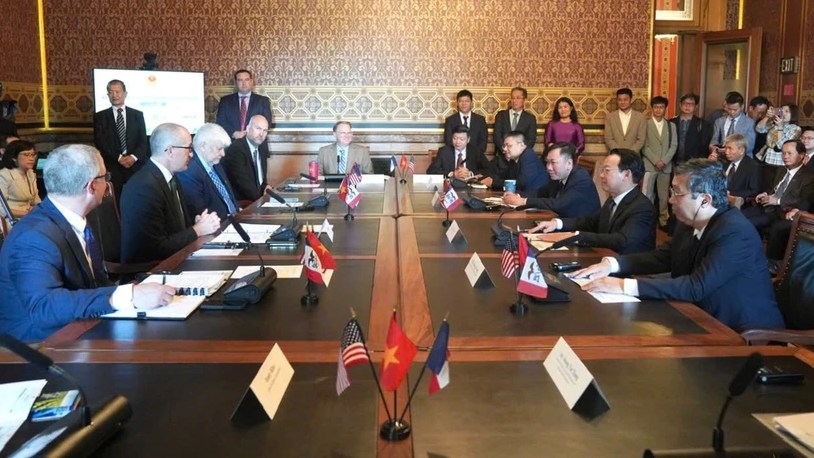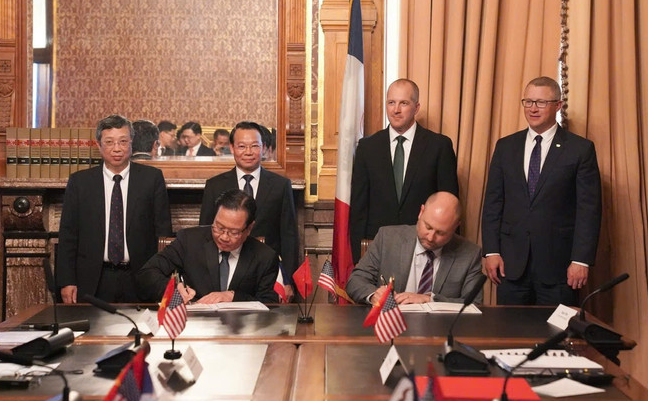Vietnam set to buy US farm produce worth $2 billion
The two countries can complement each other within the agricultural value chain.
THE HANOI TIMES — The Ministry of Agriculture and the Environment (MAE) is expected to sign memoranda of understanding (MoUs) for the purchase of agricultural, forestry, and seafood products from the US, worth over $2 billion.

Meeting between the MAE and Iowa Department of Agriculture and Land Stewardship. Photos: MAE
These agreements are part of Minister of Agriculture and Environment Do Duc Duy's working visit to the US from June 1 to 7.
On June 2, the two sides inked five MoUs with a total value of approximately $800 million in the state of Iowa. These agreements are primarily for the import of soybean meal, corn, wheat, and dried distillers grains (DDGS) over a three-year period.
Specifically, the local agricultural firm Khai Anh Binh Thuan will import one million tons of soybean meal from AGP, worth $380–390 million, and 900,000 tons of corn and wheat from United Grain, worth $250 million. Viet Nhat signed a contract with POET to purchase 200,000 tons of DDGS and soybean meal valued at $60–70 million.
Several other companies signed agreements to import soybeans, meat, fruits, and other agricultural products from Iowa. In addition to trade, both sides are expanding public-private cooperation. The Department of Animal Husbandry and Veterinary Services signed an MoU with the Iowa Pork Producers Association to strengthen connections, organize technical seminars, and promote trade.
During the signing ceremony, Iowa Secretary of Agriculture Mike Naig and Deputy Secretary Grant Menke expressed their desire to strengthen cooperation with Vietnam, particularly regarding high-quality agricultural products.

Signing MoUs between farm companies of Vietnam and US.
In response, Minister Do Duc Duy affirmed that Vietnam and the US can complement each other within the agricultural value chain. Representatives from both countries recognized the strong potential for collaboration, especially given Vietnam’s strengths in tropical agriculture and the US’s leadership in temperate agricultural products.
Ngo Hong Phong, Director General of the Department of Quality, Processing, and Market Development, said that free trade agreements such as the EVFTA, CPTPP, and RCEP present significant opportunities for US businesses if they meet Vietnam’s food safety requirements.
"Though primarily manual laborers, Vietnamese farmers have played a crucial role in these achievements thanks to their experience and perseverance," Phong said. "They have contributed not only to building a modern agricultural sector, but also to maintaining the price competitiveness of our export products."
Phong also noted that differences in crop seasons, driven by climate conditions, help ensure a year-round supply for both domestic and international markets. Consequently, consumers in both countries enjoy a broader selection of tropical and temperate fruits across the Pacific.
This complementarity means that agricultural trade between Vietnam and the US is more supportive than competitive, contributing to the formation of a shared Vietnam–US supply chain, he continued.
Leveraging this advantage, the Vietnamese official offered recommendations to US businesses looking to export agricultural, forestry, and seafood products to Vietnam, emphasizing the importance of complying with Vietnam’s food safety regulations. “We must make full use of the trade benefits gained through negotiations between our two governments within the framework of the growing Comprehensive Strategic Partnership,” Phong emphasized.
According to the MAE, diversifying trade partners is a key strategy for ensuring food security in a world increasingly affected by climate change, supply chain disruptions, and market volatility.
Phong said that Vietnam remains committed to working with US partners, especially the business community in Iowa, to continuously expand fair, transparent, and mutually beneficial trade relations.











